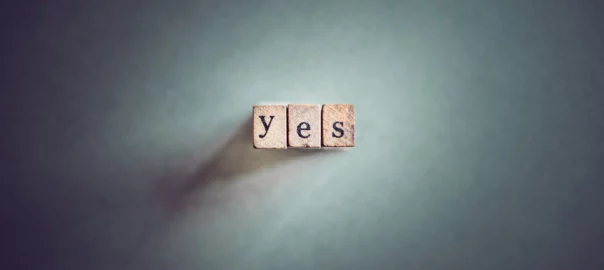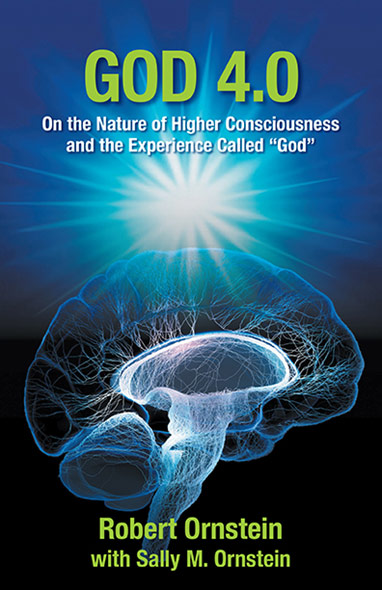
One Small Word
Sally Mallam | January 12, 2023
Yoko Ono’s Ceiling Painting/Yes Painting was shown in a London gallery in 1966. Viewers were invited to climb a white ladder, where, at the top, a magnifying glass, attached by a chain, hung from a frame on the ceiling. When viewers looked through the glass they saw one small word in tiny block letters: YES. John Lennon apparently met Yoko Ono, his future wife, through that piece.
Saying “YES” has been very lucky for me. It’s propelled me through a marvelous, if not quite conventional, life. One could say, I think, that each life is composed of the opportunities we get and our response to them. But recently I’ve been reflecting on the difference between the YES that I understood and responded to when I saw that artwork all those years ago—a YES that describes an uncluttered and open-minded positive intention—versus a deliberative and logical YES that governs so many actions, but sometimes seems too often directed by defined expectation and self-interest.
Thinking about it, we all admire and can recall stories of people whose actions stem from a positive mindset, seemingly without a thought for themselves. These are the stories we remember. For instance, the Sudanese lady who came to the United States as a refugee, and, after much struggle, started a restaurant in her neighborhood. When the place was burned down by rioters, her first act was to ensure that her staff were taken care of, using the last of her savings. To her it was normal—how could she not do that? Her second consideration was for the perpetrators of the fire. What made them act in this way and how could they be helped?
Then there is the young boy I met in juvenile detention who risked his own life to save his niece from drowning and had no idea he’d done anything brave or unusual.
Yet another is the mother of my local bank teller who regularly takes sight-impaired children to the zoo. To augment their experience, she carefully creates exquisite models of the animals, paying particular attention to the way each species feels to the touch.
These actions all start with “YES”—an affirmation. It’s their obvious response. And why not?
While working with my late husband on his last book, GOD 4.0—On the Nature of Higher Consciousness and the Experience Called “God” which was published posthumously, I came to understand both the neurobiology behind this approach and the importance of cultivating it today.
This receptive mindset indicates the beginning of a potential continuum of expanding perceptions and understanding; a latent capacity that all humans share and that anyone of us can develop.
Neurobiologically, the mindset stimulates a different brain activation: one that bypasses the left hemisphere’s “ME-first”, step-by-step, moment-by-moment, way of dealing with the world that is our normal every-day consciousness, and switches to the right hemisphere triggering a spontaneous, wider, more comprehensive intuitive understanding of a situation and our role in it.
This expanded activation exists on a continuum. It ranges from an initial intuitive YES action, or the solution to a frustrating problem suddenly arriving in the mind, to the creative acts of poets, writers, artists and scientists (Tupac, Wordsworth, Einstein, Ramanujan, Mozart, Ellington, and on), and finally to the world-transforming intuitive insights of Reality, Love and Truth that our prophets and spiritual teachers (Hillel, Jesus, Muhammad, and so many others) experience and speak of.
So, how do we develop this ability and do so without disrupting our very busy lives? One way offered right now is to expose our brains to a body of literature designed specifically for this task. The strange thing about this literature is that it mainly consists of hundreds of entertaining stories—folktales, but with a difference. They were collected by the writer and savant, Idries Shah, who having developed this latent capacity himself, was able to select those tales appropriate to the further development of it in our modern minds.
Reading and re-reading these tales and narratives, allowing them to become familiar and easy to recall, encourages this different awareness—a skill to develop—as we go about our daily lives. It’s a gentle process and one that requires “ME-first” to get out of the way. The first step, of course, is to recognize this ME. Many of the stories in this corpus help with this, particularly those that take place in the ‘Land of Fools,’ or concern the Eastern folk hero, Nasrudin.
As this capacity becomes stabilized, it functions in parallel to our normal consciousness. We intuitively take productive actions and develop an ability to connect to others in a way that addresses our real shared situation. With practice we can cultivate a selfless wider perception of our problems and an understanding that leads to positive action in the knowledge that we are all one.
We might theoretically know this, but need to develop this heightened perception to experience its reality. Once we do we will be better able to address not only our own problems, but the global dilemmas that so badly need to be solved today.
For anyone who’d like to see what these stories are like, The Idries Shah Foundation lists all the author’s titles and each book can be read online for free. I recommend starting with Tales of the Dervishes. You’re in for a treat.
Sally Mallam is the current executive director of The Institute for the Study of Human Knowledge (ISHK) and executive editor of The Human Journey project.
Recent Blogs
- Our Subpersonalities and Many-Sided Selves
- An Old Story About Metaphysics
- The Conditioning Machines in Our Back Pockets
- Out on a Limb: The Danger of our Innate Shortsightedness
- Edward T. Hall: Culture Below the Radar
- The Half Brain Method
- 'He Who Tastes Knows': Contemporary Sufi Studies and the work of Idries Shah
- "They Saw a Game"
- A Funny Thing Happened on the Way to Enlightenment
- Finding the Right Way Home
- Time and Self
- Escaping the Either/Or Thinking Trap
- Looking Up, Looking Out
- Conditioning and the Gendered Brain
- New World, Same Mind?
- One Small Word
- Meaning: The Enduring Gift to Spirit
- Beyond East and West: Human Nature and World Politics
- Forest Smarts: A Part of or Apart From?
- How to Improve Group Decision-Making
- We Know More Than We Think We Do
- How Deep Can a Story Go?
- Lost and Found: An Encounter with the Intuitive Mind
- The Devil’s Tuning Fork
- Welcome to The Human Journey Blog

